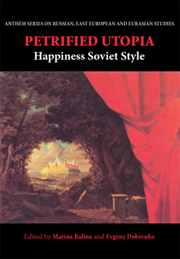Book contents
- Frontmatter
- Contents
- List of Illustrations
- Acknowledgments
- List of Contributors
- Introduction
- Petrified Utopia
- Part One Utopics
- Part Two Realities
- Part Three Locations
- 9 The ‘New Moscow’ and the New ‘Happiness’: Architecture as a Nodal Point in the Stalinist System of Value
- 10 Andrei Platonov's Happy Moscow: Tolstoi, Stalin and the Soviet Self
- 11 ‘But Where is Your Happiness, Alevtina Ivanovna?’: New Debates about Happiness in the Soviet Films of 1956
- 12 Easy on the Heart; or ‘Strength Through Joy’
- Notes
- Index
9 - The ‘New Moscow’ and the New ‘Happiness’: Architecture as a Nodal Point in the Stalinist System of Value
from Part Three - Locations
Published online by Cambridge University Press: 05 March 2012
- Frontmatter
- Contents
- List of Illustrations
- Acknowledgments
- List of Contributors
- Introduction
- Petrified Utopia
- Part One Utopics
- Part Two Realities
- Part Three Locations
- 9 The ‘New Moscow’ and the New ‘Happiness’: Architecture as a Nodal Point in the Stalinist System of Value
- 10 Andrei Platonov's Happy Moscow: Tolstoi, Stalin and the Soviet Self
- 11 ‘But Where is Your Happiness, Alevtina Ivanovna?’: New Debates about Happiness in the Soviet Films of 1956
- 12 Easy on the Heart; or ‘Strength Through Joy’
- Notes
- Index
Summary
‘Life has become better,’ the Stalinist slogan of 1935 ran, ‘has become gayer.’ But is that really what happiness is about? All that jollity, all those ‘carnivals’ in Moscow's Gorky Park, and so forth, of those times did, in fact, make Soviet life ‘gayer’, more fun, for their brief duration; but happiness in general arguably refers to a state of longer duration, as when we say, ‘He or she has a happy marriage,’ or ‘X is happy in their job,’ etc. I would put happiness a register or two above contentment, but below bliss. Happiness is not about the ecstatic, but more about a fairly even, stable and positive state of being; perhaps about a sense of self-fulfillment.
As it happens, there has been a spate of books and articles on happiness lately, including a history of happiness. The consensus: sociologists have established that although people are living better now versus a few decades ago, they are less happy. Commentators are even proposing a new version of the guns-versus-butter dilemma; governments allegedly now have to choose between greater material well-being for their citizens and greater happiness. As we look at Stalinist Russia, we can see this alternative less as a dilemma than in terms of competing aims. On the one hand, the state sought to raise the standard of living, to increase the supply of creature comforts and consumer goods. But on the other hand, it was arguably more concerned with what it saw as self-fulfillment for its citizenry.
Information
- Type
- Chapter
- Information
- Petrified UtopiaHappiness Soviet Style, pp. 189 - 200Publisher: Anthem PressPrint publication year: 2009
Accessibility standard: Unknown
- 1
- Cited by
